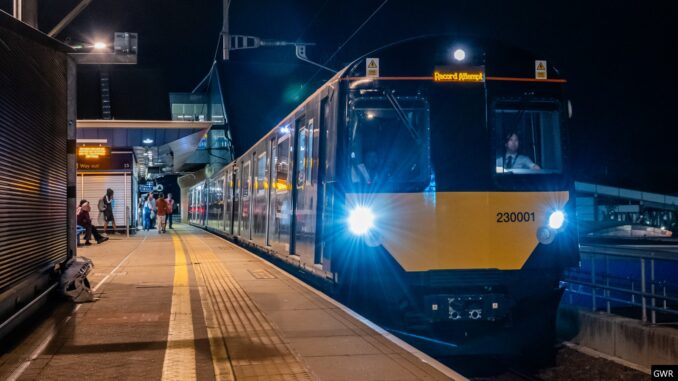
A Great Western Railway (GWR) battery-powered train has set a world record, travelling 200 miles without needing a recharge.
The new record was set by a Class 230 train, a former London Underground D78 stock train that was converted to main line and battery operation by Vivarail, which clocked up 200 miles on a return journey from Reading Train Care Depot which took in London Paddington (twice) and Oxford.
The previous world record, 139 miles set by Stadler Deutschland in Berlin in 2021, was well and truly beaten as GWR demonstrated the capability of battery-electric trains as it seeks to replace its ageing diesel fleet, which is expected to go out of serviceable use in the next 7-10 years.
Train 230001 is the same one that was used for GWR’s successful trial of fast-charge technology on the Greenford branch line over the past year.
The new record was witnessed and verified by officials from the Rail Performance Society, an organisation dedicated to recording and studying the performance of railways and railway traction in the UK.

GWR engineering director Dr Simon Green commented: “We’re delighted to set a new world record – and to reach 200 miles in such a landmark year for the rail industry is the icing on the cake. It’s a real tribute to colleagues at GWR and Network Rail who have worked so hard on developing fast-charge technology.
“Today’s record attempt has been a bit of fun, but it also underlines a serious point: investment in battery technology is essential as we look to replace our ageing diesel fleet.
“Overhead lines will remain the first choice to power electric trains, but where that isn’t possible or desirable, battery technology like this offers a reliable and efficient alternative to bridge the gap.
“As part of our future rolling stock plans we’ll need battery trains to routinely cover over 60 miles between charges – and today’s achievement provides clear evidence that this is a viable and exciting solution for the future of our railway.”

Unfortunately for GWR, its success was somewhat marred by problems elsewhere on its network.
Sunday Times deputy business editor Oliver Gill attempted to catch the 07:20 train from Reading to Gatwick but found that it was cancelled due to “more trains than usual needing repairs at the same time”.
Oliver took to social media to draw attention to the “battery-powered train stunt”, claiming that GWR was trying to run before it could walk.
You can’t win them all…


Be the first to comment